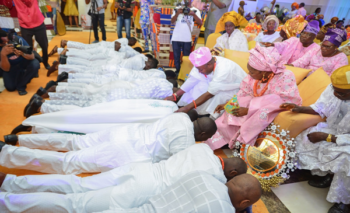By Yekeen Olawale Wakeel
Respect is one of the significant aspects of Yoruba culture. Prostrating to greet is called Idobale which refers to meeting the earth. It is regarded as a sign of humility. Men greet older people with bows, while women kneel. Yoruba culture also emphasises respect in greeting and conversation, using pronouns like “e” for older people and “o” for person’s of the same age.
Cultural prostration otherwise known as Idobale is a practice among the Yoruba people of Western Nigeria, which involves the prostration of a male person before an elderly person. This culture or practice signifies respect or paying homage to a superior authority.
A young person who prostrates to greet an elderly person is seen as one who has been ‘well trained’. Prostrating has two dimensions in Yorubaland. For the men, it is called ‘Idobale’ while for the women it is called ‘Ikunle’ and involves kneeling down as opposed to the prostration done by males. Prostrating is beneficial for curbing the impulse in our societal ego and helps one to develop humility in society.
Idobale is a very beautiful cultural display during a Yoruba traditional wedding, it is a must for the Groom and the Groom’s family. This shows a sense of respect for the marriage rite.
During the traditional wedding, the Groom and his friends must prostrate before the bride’s family and in-laws. This shows that the groom has maximum respect for his in-laws. It also shows that he cherishes and values his wife-to-be.
Once the Groom prostrates before the bride’s parents during the traditional wedding, they (the bride’s parents) begin to shower him with prayers, blessings and goodwill.
They also shower him with accolades amidst loud drum beats while the father in law lifts him up and embraces him. All these processes have a significant role in the marriage rite in Yorubaland. This culture is only seen during the wedding ceremony.
Another dimension of Idobale (prostrating), is equally engaged while paying obeisance to a king or ruler. It is often believed that you cannot greet a ‘crowned king’ while standing or bending. No matter your age or social status, you must prostrate to greet the king.
It is taboo to handshake a king or just bend. The prostrating process in kingly greetings shows that the king is revered. By this, you equally secure the king’s blessings and favour.
However, Idobale as earlier stated has been a practice with the Yoruba people since inception as it has been their major mode of greeting. It is seen as a manner of respect not only to kings but to parents and elderly persons.
It is however unfortunate that this beautiful culture is going into extinction as civilization is turning the younger ones into ‘civilised puppets’. A lot of Yoruba people now prefer handshakes or subtle bending as a method of greeting elderly ones.
Western culture is gradually taking over our societal values and culture. People now see you as being crude when you prostrate to greet the elderly persons.This shouldn’t be encouraged among the younger generation.
A lot of parents should endeavour to make their children have their basic education in Nigeria before going outside for further studies. This would give them the foundation for understanding African culture and thus it becomes a very essential part of them.
Therefore, the elderly ones should encourage the Idobale practice by inculcating and teaching the younger generations on its values and importance. Likewise, the government should encourage and elevate our African culture above the Western Culture
There is also the need to build a generation that will be promoting this culture as modernisation has overtaken most of our culture, especially Idobale. Many youths have abandoned this cultural prostration, called Idobale, to embrace western handshake method.
The beauty of Idobale is more than just a form of greeting culture. It also goes a long way to building good characters, morals and maintaining a sane society. This cultural practice should not be allowed to go into extinction because it is gradually being neglected among the youths.
Yekeen Olawale Wakeel, Chief Museum Education Officer, National Museum, Ile-Ife.

